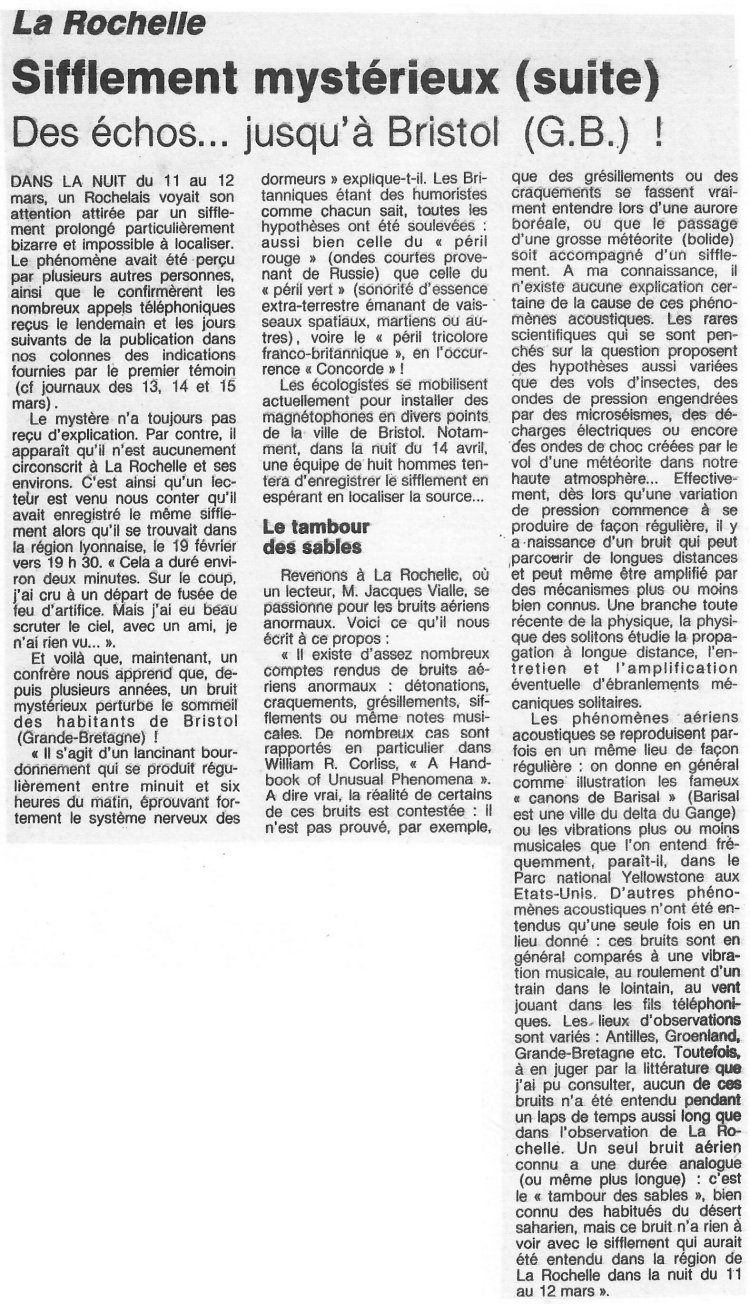The article below was published in the daily newspaper Sud Ouest, France, on March 26, 1980.

|
IN THE NIGHT of March 11 to 12, a resident of La Rochelle saw his attention attracted by a particularly bizarre and impossible to locate prolonged hissing sound.
The phenomenon had been perceived by several other people, as confirmed by the numerous telephone calls received the next day and the following days of the publication in our columns of the indications provided by the first witness (see newspapers of March 13, 14 and 15).
The mystery has not yet been explained. On the other hand, it appears that it is in no way circumscribed to La Rochelle and its surroundings. Thus a reader came to tell us that he had recorded the same whistling sound while he was in the Lyon area, on February 19 at around 7:30 p.m. "It lasted about two minutes. I thought it was a rocket fire, but I searched the sky, with a friend, I did not see anything...".
And now, a colleague tells us that since several years, a mysterious noise is disturbing the sleep of the residents of Bristol (Great Britain).
"This is a throbbing buzz that occurs regularly between midnight and six in the morning, severely testing the sleepers' nervous system," he says. The British being comedians as everyone knows, all the hypotheses were raised: the one of the "red peril" (shortwave coming from Russia) and the one of the "green peril" (sound of extra-terrestrial essence emanating from spaceships, Martians or others), even the "Franco-British tricolor danger", in this case "Concorde"!
Ecologists are currently mobilizing to install tape recorders in various parts of the city of Bristol. Notably, in the night of April 14, a team of eight men will try to record the hissing hoping to locate the source...
The sand drum
Let's go back to La Rochelle, where a reader, Mr. Jacques Vialle, is passionate about abnormal airborne sounds. Here is what he writes about this:
"There are quite a number of reports of abnormal airborne sound - detonations, crackling, whistling, or even musical notes - many of which are reported in particular in William R. Corliss' "A Handbook of Unusual Phenomena." To tell the truth, the reality of some of these noises is disputed: there is no evidence, for example, that crackling is really heard during an aurora borealis, or that the passage of a large meteorite (bolide) is accompanied by a whilstling sound. I know there is no definite explanation for the cause of these acoustic phenomena, the few scientists who have studied the matter propose hypotheses as diverse as flights of insects, pressure generated by microseisms, electric shocks or shock waves created by the flight of a meteorite in our upper atmosphere... Indeed, as soon as a pressure change begins to occur on a regular basis, noise is produced that can travel long distances and can even be amplified by more or less well-known mechanisms. A very recent branch of physics, soliton physics is studying long-range propagation, duration and possible amplification of solitary mechanical shocks.
Acoustic air phenomena sometimes reproduce in the same place on a regular basis; in general, the famous "Barisal canons" (Barisal is a town in the Ganges delta) or the more or less musical vibrations often heard, it seems, in the Yellowstone National Park in the United States. Other acoustic phenomena have been heard only once in a given place: these noises are generally compared to a musical vibration, the rolling of a train in the distance, the wind playing in telephone wires. The places of observation are varied: West Indies, Greenland, Great Britain etc. However, judging by the literature that I have been able to consult, none of these noises have been heard for a period of time as long as in the observation of La Rochelle. A single known aerial noise has a similar duration (or even longer): it is the "sands drum", well known to the regulars of the Saharan desert, but this noise has nothing to do with the whistling that would have been heard in the region of La Rochelle in the night of March 11 to 12 ".